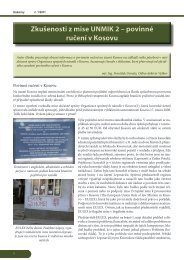TRADOC Pam 525-3-7-01 - TRADOC - U.S. Army
TRADOC Pam 525-3-7-01 - TRADOC - U.S. Army
TRADOC Pam 525-3-7-01 - TRADOC - U.S. Army
- No tags were found...
You also want an ePaper? Increase the reach of your titles
YUMPU automatically turns print PDFs into web optimized ePapers that Google loves.
<strong>TRADOC</strong> <strong>Pam</strong> <strong>525</strong>-3-7-<strong>01</strong>Fourth, the <strong>Army</strong> may need to compress the leader education and development timeline forinterpersonal and cognitive skills, while keeping the process repetitive. As noted earlier, thefuture OE will continue to demand competence on complex cognitive tasks from younger, lessexperienced officers and NCOs. Yet, research on human performance has shown that anindividual typically needs about 10 years to master a complex set of skills. This does not suggestthat Soldiers of all ranks require ten years to become proficient in their specialties, but ratheracknowledges that mastery and complexity will take longer if the <strong>Army</strong> does not find ways toaccelerate the learning process. Finding and applying technological or other means ofcompressing learning times, to the extent possible, will be a top priority for the future leadereducation and development system. Leaders must have on demand access to experientiallearning opportunities such as virtual vignettes, with automated coaches and mentors that enablethem to practice the adaptable decisionmaking skills needed to react quickly and instinctively tonew operational situations. The <strong>Army</strong> needs to invest in training exercises and materials that willdevelop cognitive and interpersonal skills in a rapid but effective way. Future experimentation,studies and research in learning S&T can make significant contributions by identifying additionalmeans of accelerating learning and providing the realistic virtual humans needed to serve ascoaches and mentors.Fifth, the <strong>Army</strong> needs to find ways to intensify learning in operational assignments. “Abalance between operational and educational experiences provides the best method to trainSoldier and grow leaders.” 130 Future S&T research must explore ways to increase the learningvalue of everyday experiences, especially in operational assignments. It is unlikely thatapproaches will be prescriptive (for example, dictating trained tasks). Instead, they will focus onincreasing awareness of experiential learning and taking advantage of and documenting learningthat takes place naturally throughout the workday. <strong>Army</strong> surveys consistently show that the bestopportunities for leader-development are in the context of the real duties performed by leaders.Sixth, as the RAND Corporation has recently argued in its report, Something Old andSomething New—<strong>Army</strong> Leader Development in a Dynamic Environment, leader education, at the<strong>Army</strong>’s schools and through graduate civilian education, continues to play a critical role inpreparing leaders to meet the challenges of the future OE. 131 Education provides the cognitivegrounding that contributes, along with operational experience, to effective decisionmaking inambiguous operational situations, and does so within an environment that is conducive todiscussion among peers, and free exploration and contemplation of ideas. 132 This somewhattraditional role of leader education takes on even greater significance given the current andanticipated future OE where highly developed decisionmaking skills are of paramountimportance. Leader education must also address increased breadth of knowledge andperspective. The RAND Corporation has concluded that, “…familiarity with external institutionsand cultures (for example, other services, joint commands, and government agencies… isachievable only through contact with external institutions, and its importance argues for greaterexposure of officers to graduate education and broadening assignments outside the <strong>Army</strong>.” 133This theme is echoed by General David Petraeus in his article, Beyond the Cloister, in which heargues that, among other reasons, civilian graduate education is important for <strong>Army</strong> leaders isbecause there they can discover how diverse and divergent views can be. 134 The <strong>Army</strong> mustconsider providing leaders with more dedicated learning time in school and unit settings,115



